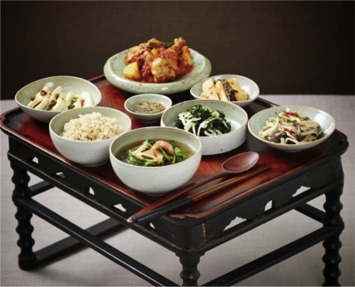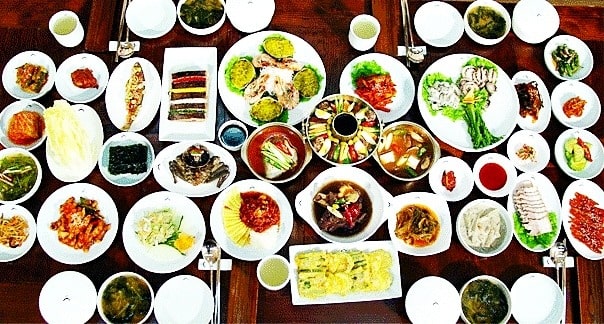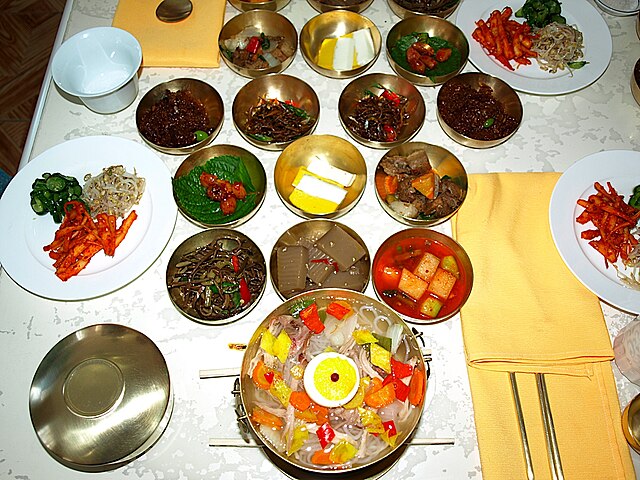Chosun cuisine combines tradition and nutrition with fermented foods, vegetables, and proteins, supporting gut health and immunity.
This in-depth guide covers the nutritional facts, health benefits, and cultural significance of popular Chosun dishes, exploring why they’re considered valuable components of a balanced diet.
A Brief History of Chosun Cuisine: Culinary Culture and Traditions:

Chosun cuisine, which developed during the 500-year Chosun Dynasty in Korea, emphasizes harmony, balance, and simplicity in food. Historically, Korean meals were structured around five basic colors—green, red, yellow, white, and black—representing elements like wood, fire, earth, metal, and water. This concept influenced not only the visual appeal of Korean food but also its nutritional balance, ensuring that each meal provided a variety of nutrients.
Traditional Chosun Dietary Values and Cooking Techniques:
- Seasonal Ingredients: Korean cuisine heavily relies on seasonal, local ingredients, providing fresh and nutrient-dense dishes.
- Fermentation for Flavor and Health: Fermentation was developed not only for preservation but also to enhance nutritional value.
- Focus on Plant-Based Ingredients: The cuisine traditionally includes abundant vegetables, grains, and legumes, ideal for health-conscious eaters.
The Nutritional Powerhouse of Key Chosun Dishes:
Each Chosun dish is crafted to deliver a unique balance of flavors and health benefits. Here, we examine popular dishes in depth, highlighting their nutritional content and associated health benefits.
Kimchi: The Superfood of Korea:
Kimchi, a staple in nearly every Korean meal, is made by fermenting napa cabbage or radish with garlic, ginger, chili peppers, and sometimes fish sauce. This process not only enhances the flavor but also boosts the nutrient profile, making it a superfood rich in vitamins, antioxidants, and probiotics.
- Nutritional Content (per 100 grams):
- Calories: 25-30 kcal
- Carbohydrates: 4 grams
- Fiber: 2 grams
- Vitamin C: 40-50% of daily requirement
- Vitamin K: 55-60% of daily requirement
Health Benefits:

- Gut Health: Probiotics from fermentation promote digestive health, reduce inflammation, and may even boost mental health.
- Immune Support: Kimchi’s high vitamin C and antioxidant content help bolster the immune system.
- Weight Management: Low-calorie, high-fiber properties make kimchi ideal for feeling full and satisfied without overeating.
Bibimbap: A Nutrient-Dense Meal in a Bowl:
Bibimbap, meaning “mixed rice,” is a colorful and balanced meal of rice topped with a variety of vegetables, a source of protein, and often an egg. The flavors are tied together with gochujang, a spicy fermented chili paste, adding a depth of flavor and probiotics.
- Nutritional Content (per serving):
- Calories: 490-550 kcal
- Protein: 12-15 grams (with egg or meat)
- Carbohydrates: 80-90 grams
- Fiber: 6-8 grams
- Vitamins: High in vitamin A, vitamin C, folate, and potassium
Health Benefits:
- Balanced Macronutrients: Provides protein, carbohydrates, and fats in balanced proportions, ideal for energy and muscle maintenance.
- Rich in Fiber: High fiber content from vegetables promotes digestion and helps maintain blood sugar levels.
Also Read: Metabolic and Nutritional Medicine from MMI – A Comprehensive Guide!
Bulgogi: A High-Protein Delight:
Bulgogi, often called “Korean BBQ,” consists of marinated beef or pork, grilled and served with rice or lettuce wraps. Its marinade typically includes soy sauce, sugar, sesame oil, garlic, and green onions, creating a sweet-savory flavor profile.
- Nutritional Content (per 100 grams):
- Calories: 150-200 kcal
- Protein: 10-12 grams
- Iron: 15% of daily requirement
- Vitamins B6 and B12: Support metabolic health and energy levels.
Health Benefits:
- Protein Power: Supports muscle health and repair, making it a good option for active individuals.
- Heart Health: Moderate amounts of healthy fats from sesame oil may support cardiovascular function.
- Rich in Minerals: Provides iron and zinc, which are essential for immunity and cellular repair.
Japchae: A Low-Fat, Satisfying Option:

Japchae is a popular Korean dish made with stir-fried glass noodles, vegetables, and sometimes beef. The noodles, made from sweet potato starch, are naturally gluten-free and low in fat.
- Nutritional Content (per serving):
- Calories: 300-350 kcal
- Protein: 5-8 grams
- Carbohydrates: 60 grams
- Fiber: 4-5 grams
- Vitamins: Rich in vitamins A, C, and E
Health Benefits:
- Complex Carbohydrates: Offers slow-releasing energy, keeping blood sugar stable.
- Antioxidants from Vegetables: Carrots, spinach, and bell peppers add a powerful blend of vitamins and antioxidants.
- Low in Saturated Fat: Japchae is naturally low in fat, making it ideal for those managing cholesterol levels.
Nutritional Value of Core Chosun Ingredients:
Beyond the individual dishes, many core ingredients in Korean cuisine offer unique nutritional properties. Here’s a closer look at these powerhouses and how they contribute to the healthfulness of Chosun food.
Also Read: How Does Exercise Improve Mental Health – The Essential Role of Exercise!
Garlic and Ginger:
These staples in Korean cooking add a pungent flavor and are valued for their medicinal properties.
- Garlic: Contains allicin, which has antibacterial and anti-inflammatory properties.
- Ginger: Known for digestive benefits and anti-nausea effects, ginger is also rich in antioxidants.
Fermented Soy Products (Doenjang and Gochujang):

Fermented soy products are integral to Korean cuisine and provide protein, probiotics, and isoflavones—beneficial plant compounds that may reduce the risk of heart disease.
- Doenjang: Rich in calcium, magnesium, and iron, as well as probiotics.
- Gochujang: A great source of capsaicin, an antioxidant that may boost metabolism and support fat loss.
Seaweed:
An essential ingredient in Korean soups and side dishes, seaweed is packed with iodine, fiber, and minerals.
- Iodine: Essential for thyroid health, supporting metabolic regulation.
- Fiber: Supports digestive health and provides a feeling of fullness.
How Chosun Cuisine Supports a Health-Conscious Lifestyle:
Chosun cuisine naturally aligns with the principles of a balanced, nutrient-rich diet. Here are some reasons it’s ideal for those looking to enhance their diet with whole foods and diverse flavors:
- Natural Probiotics: Regular consumption of fermented foods supports gut health, which is linked to immunity, mental health, and digestion.
- Plant-Based Emphasis: With a high intake of vegetables, seaweed, and plant-based proteins, Korean cuisine is often nutrient-dense and low in unhealthy fats.
- Spice and Variety: Ingredients like chili peppers, garlic, and ginger enhance flavor without the need for excessive salt or sugar, making dishes both satisfying and healthful.
Also Read: Exercise is the Best – The Ultimate Key to Health and Happiness!
Tips for Incorporating Chosun Cuisine into Daily Life:
Embracing Chosun cuisine can be simple, even if you’re new to Korean cooking. Here are some tips to get started:
- Add Kimchi to Your Meals: Kimchi pairs well with rice, salads, and even sandwiches, adding a probiotic boost and a spicy crunch.
- Experiment with Gochujang: Use gochujang as a sauce base for stir-fries or as a marinade for proteins, adding depth of flavor and nutrition.
- Make Your Own Bibimbap Bowls: Try making bibimbap at home with brown rice, mixed vegetables, and your choice of protein for a balanced meal.
- Snack on Seaweed: Seaweed snacks are a convenient and nutritious option, rich in minerals and low in calories.
FAQ’s
1. What makes Chosun cuisine nutritious?
Chosun cuisine relies on fresh, seasonal ingredients, fermentation, and a balance of plant-based and protein-rich foods, delivering essential nutrients and probiotics.
2. Why is kimchi considered a superfood?
Kimchi is rich in vitamins, antioxidants, and probiotics, supporting gut health, immunity, and weight management.
3. What are the health benefits of bibimbap?
Bibimbap provides a balanced mix of proteins, carbohydrates, and fats, along with fiber and antioxidants from vegetables, promoting overall health.
4. How does bulgogi benefit health?
Bulgogi is high in protein, iron, and vitamins B6 and B12, supporting muscle health, energy, and immunity.
5. What role does fermentation play in Chosun cuisine?
Fermentation enhances flavor, preserves nutrients, and introduces probiotics that benefit digestion and immune function.
Conclusion
In conclusion, Chosun cuisine offers a rich tapestry of nutritional benefits through its emphasis on balance, seasonal ingredients, and traditional cooking methods. Dishes like kimchi, bibimbap, and bulgogi not only showcase the diverse flavors of Korean culture but also support gut health, immunity, and overall well-being. By incorporating Chosun dishes into daily meals, individuals can enjoy a delicious and healthful approach to dining.